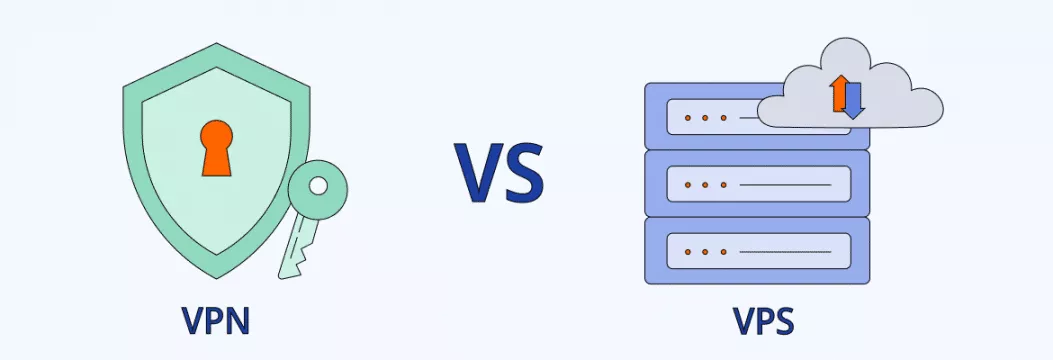VPN vs VPS – What’s the Real Difference and Which One Do You Need?
Virtual private networks (VPNs) vs virtual private servers (VPS): two anonymously annoying acronymes that are really as opposite as chalk and cheese. Surely, they both have both the virtual and the private in their names, but upon what they are doing, the difference between the two is quite significant. A VPN is a provision that secures your internet traffic with encryption that provides you with a secure online experience and VPS is a virtual machine that runs on physical hardware – a flexible, scalable hosting provision that is ideal when you need a little more control over your online presence.

What is a Virtual Private Network (VPN)?
A VPN is simply a safe and encrypted tunnel that allows you to access the network without fearing that your information is being espionage by snoopers or hackers. With a connection that is secure to a VPN server, you can save yourself the spying by ensuring that you are not the target even when you are on questionable hotspots in the cafes or airports. But how does it work? It is rather easy, actually, a VPN routes your web traffic over a secure server, and encrypts them, and then masks your IP address, so that you appear as though you are somewhere other than where you are on the planet. And here are only some more reasons why you may want to use the VPN because:
- To keep your data safe from prying eyes, be they your ISP, ad agencies, hackers, or anyone else who might be interested in getting their hands on it.\
- To bypass all those annoying geo-restrictions that stop you from accessing the content you want.\
- To stay safe when using public Wi-Fi\
- To prevent your internet from being throttled\
- To secure and control access to company infrastructure\
- And, of course, VPNs are a must-have for providing safe and secure connections to company resources from remote locations.
VPNs are an essential tool in a hybrid work environment, where people are constantly on the move and need to be able to access company resources from anywhere.
Are you thus convinced that a VPN is the tool that you need? So, what is stopping you to give VeePN a spin? They have 2500 servers which are spread in 90 locations and 60 countries and that is why they are the best option to anyone who needs to get content anywhere on the planet. And the best thing is that it is even simpler to operate, all you have to do is to choose a server in which you want to be associated to and then away you go. Fancy it still less difficult? Just simply use the feature of Optimal Location and VeePN will do the trick, automatically choosing the fastest server to serve you.
VPNs are also an excellent method to be safe on a public Wi-Fi and not become the targets of a hacker and snoopers. And, you can be confident that your information is safe in the hands of encryption standards such as TLS and IPsec. However, it is worth mentioning that VPNs offer secure connectivity, at the expense of being able to control the networking infrastructure – it is marvelous when it comes to keeping you secure, but not when it comes to being capable of configuring your network start to finish.
VPN provides a safer and more secure encrypted channel between your machine and the VPN server to secure your internet traffic and user data. And, since VPNs have the capability of changing your IP address, they also can assist you to evade targeted ads. That is to say, whether you are surfing with a sketchy Wi-Fi connection, you can always be guaranteed that no one is looking over your shoulder.
How Does a VPN Work?
But what is the mechanism of a VPN? Well, it is quite easy indeed, a VPN makes a secure encrypted tunnel to a VPN server, which subsequently encrypts all of your internet traffic and hides your IP address. And that’s it. After turning on the VPN client, everything on your computer and your browser is encrypted, and everything in your applications. So, when you do go online, using a sketchy Wi-Fi network, you will be confident that there are no gawking faces that can see what you have to say.
Pros and Cons of VPNs
What are the Benefits of a VPN Secure Connection?
So, what are the benefits of using a VPN to secure your connection?
- Enhanced Security – Your data travels a long way when you’re surfing the web, and if it’s not protected, it can end up in the wrong hands. Which is not what you want. So, how can you keep it safe? Via encryption, of course! And that’s exactly what top VPN providers like VeePN do – they use AES-256 encryption, which is the strongest one going, and completely unbreakable by brute force attacks.\
- Always-on Privacy – The internet is a pretty scary place, and there are plenty of third-party trackers out there who are just waiting to pounce on any data they can get their hands on. A VPN puts a stop to that by hiding your browsing activity and IP address, and giving you the online anonymity you deserve. And VeePN has the NetGuard feature, which blocks ads, trackers and malicious websites and keeps snoopers at bay.* No bandwidth throttling. Some ISPs are notorious for slowing down your connection on purpose – but by sending all your traffic through an encrypted tunnel, a VPN stops that from happening. Your data won’t even make it to your ISP in the first place, so they can’t throttle your connection. which is a pretty big win.
- User-friendly. Premium VPNs, like VeePN, are dead easy to use. No complicated setup required. You just download the app, create an account, and connect to a server.
- Unlimited access to content. With a VPN, you can browse the web however you want. Want to watch a show that’s only available in the US, but you live in Europe? No problem. Just connect to one of VeePN’s American servers and have at it.
- Better gaming experience. And a VPN has something for gamers too. It keeps you safe from DDoS attacks and can even stop you from getting unfairly banned from an IP.
What are the drawbacks of a VPN?
- Free VPNs are not safe. Yeah, they might be tempting, but free VPNs are basically just a bad idea. They either limit you in some way or sell your data to make a profit.
- Slower connection speeds. Okay, so encryption does take up some processing power, which can slow things down a bit. But most modern VPNs are pretty fast, with protocols like WireGuard making it all but invisible.
- Reliable VPNs require an investment. Sorry, nothing in life is free. If you want a VPN that actually works, you’ll have to pay for it. But trust us, it’s worth it.
What is a virtual private server (VPS)?
Now, does a VPS have anything to do with a VPN? Absolutely not.
VPS stands for Virtual Private Server, and it’s basically a server that’s been split into little chunks. It’s a flexible, scalable and secure way to host your website or application. A virtual private server is like a virtual machine that you get through an internet hosting service. It gives you the same kind of experience as having a dedicated server, all for a lower price.
A server is basically the ‘home’ for all your website’s data and files, and with a VPS, that home is ‘private’ because the server is all yours. You get dedicated server resources like CPU and memory without having to buy actual hardware. It’s ‘virtual’ because it’s created using a parent server that’s hosting multiple virtual servers that act like separate entities. Unlike shared hosting, where loads of users are sharing resources on one server, a VPS gives you all the resources you need, which is great for performance and security.
VPS hosting providers have multiple data centers to make sure everything runs smoothly, reduce latency and make everything more reliable. VPSs make it easy to scale up or down, so you can add or remove server resources as you need to. You also get full control over your server environment, including the ability to install software and manage settings. VPSs are a great balance between being in control and not breaking the bank, and are a popular choice for businesses who need a bit of extra security and performance.
But VPSs aren’t totally scalable, and they can host multiple apps or sites on the same server, which makes them really convenient and cost-effective. They’re a great fit for businesses that need a bit of customization and control, but don’t want to break the bank. VPSs make life easy for businesses that need to manage web applications or services without having to deal with the hassle of physical servers.
In short, VPSs are like a virtual server that’s all your own. They’re secure, flexible, and scalable, and are a great choice for businesses who need a bit of extra oomph.So, you can think of a VPS as a massive computer thats running lots of smaller computers inside it, each with its own server resources and the ability to tap into other resources like the CPU, hard drive, and various tools.
A VPS is usually employed for smaller workloads that demand consistent performance. Here’s when businesses might turn to this solution :
- Hosting 1 to 10 websites that have high traffic volumes
- A website is exceeding the limits of its shared hosting arrangement
- Root access to the server is required
- As a business grows, they need a setup that can scale with them
How does a VPS actually work?
Before we dive into how VPS’s work let’s take a quick look at two other web hosting solutions :
- Shared hosting — where RAM and storage are shared between all users. There also is a security concern because if one site gets infected it can take out the entire server.
- Dedicated hosting — this is the exact opposite, you get a whole server all to yourself. All the resources are yours, and you can tweak the software to fit your needs.
A VPS sits somewhere in the middle. VPS technology creates a virtual environment thats dedicated to just your domain. You get a guaranteed allocation of system resources that are all yours – your own operating system, dedicated storage, a powerful processor, and scalable RAM. VPS’s give you dedicated server resources like CPU and memory without requiring a big investment in hardware, and they make use of other resources like storage and bandwidth to meet your hosting needs. They give you dedicated server resources so you can deliver dedicated service for your applications, ensuring your server resources are all isolated and customisable. You can install your preferred software and manage the settings to fit your needs. VPS’s also make it easy to scale resources as needed and allow you to easily monitor and manage server load through control panels. They create a secure environment for server hosting that strikes a balance between autonomy and economy for businesses. VPS’s are commonly used for web hosting, providing greater security and performance improvements compared to traditional shared server space. The key advantage of a VPS is that it finds a balance between giving you the freedom to do as you want, while also being cost effective – its like having your own operational space right on a shared server.
Virtual Server and Virtual Private Cloud
A virtual server is essentially a virtual machine that runs independently on a bigger physical server, giving you all the resources you need like CPU, RAM and storage. Its a pretty common setup for web hosting, application hosting and other server based tasks. It gives users flexibility and control, without them needing the expense of a dedicated physical server.
Conversely, a virtual private cloud (VPC) is a private cloud system that is constructed on a public cloud system. It provides you with safe, remote environment where you can administer your own computing, storage and networking capabilities. By a VPC you will receive the scale of the cloud resources such as easy increase or decrease of the resources without losing a high level of safety and control over the environment.
With a virtual server paired with a virtual private cloud, businesses will be in a position to develop a strong, highly secured and scalable infrastructure of their applications and services. It is the best option in organisations that require dedicated resources, but at the same time, require being able to respond promptly to changing demands and save money, a private cloud environment.
Creating Your Own VPN
Setting up your own virtual private network (VPN) gives you complete control over how your online security and privacy work. To get started, you’re going to need a VPN server, which can be either a dedicated server or a VPS. This server acts as a secure gateway for all your internet traffic, encrypting all your data as it goes between your device and the rest of the internet.
You’re also going to need to choose and configure a VPN software to go on your server and devices – popular options include OpenVPN, PPTP or L2TP/IPSec. Once its all set up, the software creates a private network that keeps all your sensitive data safe from prying eyes. Proper configuration is key : you’ll want to set strong authentication methods and keep your VPN server up to date to prevent security vulnerabilities.
By setting up your own VPN, you’re not dependent on a third party VPN provider, which means you have total oversight of how your data is handled. This is especially important for those that care deeply about online security, need to protect sensitive data, or want secure remote access to a private network. With your own VPN setup, you can customise it to your needs and enjoy the peace of mind that comes with knowing your internet traffic is being protected by your own rules.
VPN Gateway and Network ConfigurationA VPN Gateway – That Bridge Between Your Private Network & The Internet
A VPN gateway is the unsung hero of internet security, serving as a bridge between your private network and the wider world. It stops your sensitive data from getting siphoned off into cyber space by encrypting and decrypting all your internet traffic as it passes to and fro. Be this a dedicated device or a server running VPN software, the VPN gateway is a must-have for any business or organisation that needs to securely connect remote users or branch offices to its local network.
To get your VPN gateway up and running, you will need to scratch in the VPN software, pick the right VPN protocol, and fiddle with the authentication and encryption settings to match your specific security needs. Don’t forget to configure your firewall and routing rules so that all your internet traffic is piped through the VPN gateway, ensuring only approved users can get access to your private network.
By setting up a VPN gateway and keeping a close eye on your network settings, you create a secure bubble that keeps your sensitive data safe as it moves between your local network and the internet. This is especially important for businesses which need to keep confidential information under wraps or provide a secure remote access option for employees.
Virtual Machine & Server Management
A virtual machine, or VM for short, is a software-based imitation of a physical server. Capable of running its own operating system & applications independently, this means you can have multiple virtual servers running on a single physical server, each with their own resources and configurations.
At the heart of running a reliable, secure and efficient virtual machine is effective server management. This entails all sorts of tasks, such as configuring the operating system, installing necessary software, keeping an eye on system resources and making sure you have regular updates and backups. By taking advantage of virtualization, you can make the most of your physical server’s resources, save some cash and easily scale up your infrastructure as your needs grow.
With the ability to run multiple virtual servers, each with its own operating system, you get a lot more flexibility and control over your server environment. This approach is perfect for hosting multiple websites, testing different applications, or isolating workloads for security reasons – all while maximising the efficiency of your system resources.
The Pros & Cons of VPS
What Are The Benefits Of VPS Hosting?
- Improved Performance If you’re sharing server space with another site which sees a sudden traffic spike, your own website could be negatively affected. VPS, on the other hand, makes sure your website speed isn’t affected by other users as you have your own dedicated server resources.
- Cost-Effective While VPS is more expensive than shared hosting, it’s still cheaper than dedicated hosting. You do get full control over the server, however, even though you’re sharing resources with other users.
- Customization You can customise the server to best suit your needs, such as adding more RAM or scaling down resources that are not being used. Install software, open ports, and add any needed features – all of this can be done with no need to consult the hosting provider.
- Security With your data stored on a private server, you can also keep sensitive information secure. Plus, VPS hosting makes it a breeze to set up server backups.
- Cloud-Based Solution There are a lot of cloud VPS hosting alternatives out there as well, offering even more scalability.
What Are The Disadvantages Of VPS?
- Complexity Let’s face it, VPS isn’t the easiest thing to install and maintain for the average user or a business team without the right technical expertise.
- Price VPS is less expensive than dedicated because you only pay for the resources you need. Still, for small businesses on a shoestring budget or start-ups looking to save cash, the price might be a bit steep.
So, VPS is a great middle-ground solution for those who want more power and independence compared to shared hosting but aren’t wanting to break the bank on a dedicated server. Still, it won’t be the right solution for:
- New companies struggling to make ends meet
- Businesses lacking technical skills who don’t want to go down the managed hosting route
- Companies which need the full power and resources of a dedicated server.
What’s Coming Down The Line?
The Virtual Private Servers (VPS) and Virtual Private Networks (VPN) are the sphere that is developing continuously due to the new trends in cloud computing, artificial intelligence, and the Internet of Things (IoT). With the increasing number of organisations to the cloud, the need to have a secure, scaled and flexible hosting facility will continue to increase.
VPN and VPS providers are reacting to this and devising ways on how they can provide more customisation, more security and more integration with the cloud resources. The data protection issue is becoming even more acute, as the business and individuals are becoming more conscious of the threats of online operations and the necessity to preserve sensitive information.
In the future we can look forward to more creative solutions of server hosting, secure connections and network management. The providers will also probably introduce smarter and more automated tools to control the virtual servers and the private networks which will enable the users to easily maintain the secure environment. With these trends at the forefront, the VPS and VPN services will remain critical in establishing a safer, more intimate, and more effective internet to everybody. The Bottom Line: What is the actual difference between VPN and VPS?
To be blunt, the difference is huge, and the only thing they have in common is the fact that their names are abbreviated from longer phrases. To put it simply:
- A VPN (virtual private network) is a piece of tech designed to keep your online activities safe and private.
- A VPS (virtual private server) is a way to host your website or app if you want more control than you’d get from a standard shared server deal.
The key thing to remember is that a VPN is designed to give you safe and secure access to the internet, while a VPS is a server for hosting. So, when you need to choose between a VPN and a VPS, decide whether you need to access the internet safely or host a website/application.
Both have their uses, and although they’re pretty different, they each have their fans.
FAQ
Well, they do different jobs, so it really depends on what you need. Basically, a VPN is a cyber-security tool that keeps your info private and secure on the internet. On the other hand, a VPS is a type of hosting that uses virtualization to turn one physical server into a bunch of isolated virtual servers, making it ideal for hosting websites, apps, or services that need more power and control than what a shared hosting plan can offer.
When deciding between a VPN and VPS, you’ve got to figure out whether you need safe access to the internet or hosting services.
Mostly, VPS is used for hosting websites and apps. If you opt for VPS hosting, you’ll get your own dedicated resources, plus the chance to customize and improve your site’s performance compared to shared hosting. Bottom line, it’s a flexible and reliable web hosting solution that makes it easy to deploy and manage your websites or apps, without breaking the bank for a dedicated server.
The truth is, VPS traffic can be seen easily on the network it’s on, so if you’re trying to keep your online activity private, using a VPS won’t cut it. If you want to keep your IP address and online activity secret, a VPN is what you need.
VeePN is freedom
Download VeePN Client for All Platforms
Enjoy a smooth VPN experience anywhere, anytime. No matter the device you have — phone or laptop, tablet or router — VeePN’s next-gen data protection and ultra-fast speeds will cover all of them.
Download for PC Download for Mac IOS and Android App
IOS and Android App
Want secure browsing while reading this?
See the difference for yourself - Try VeePN PRO for 3-days for $1, no risk, no pressure.
Start My $1 TrialThen VeePN PRO 1-year plan






